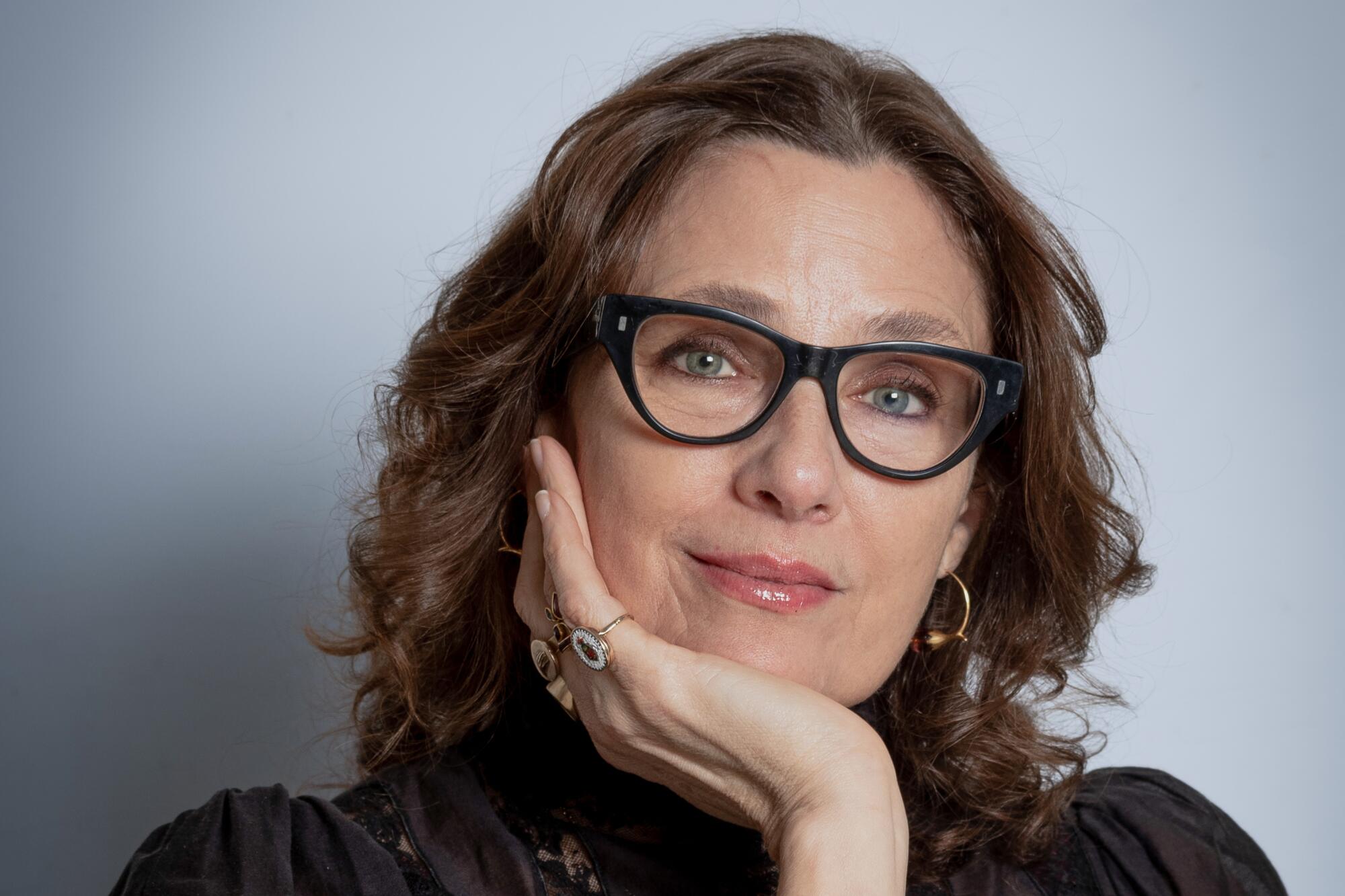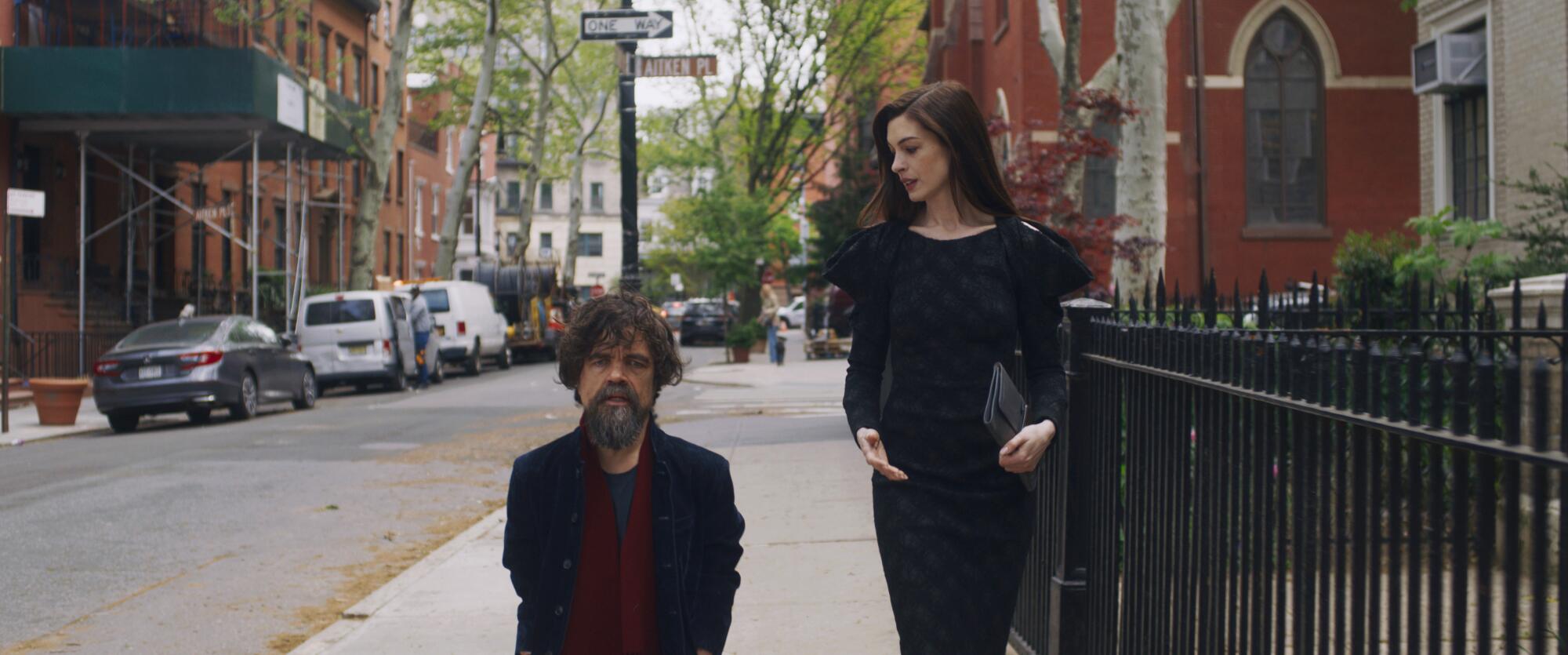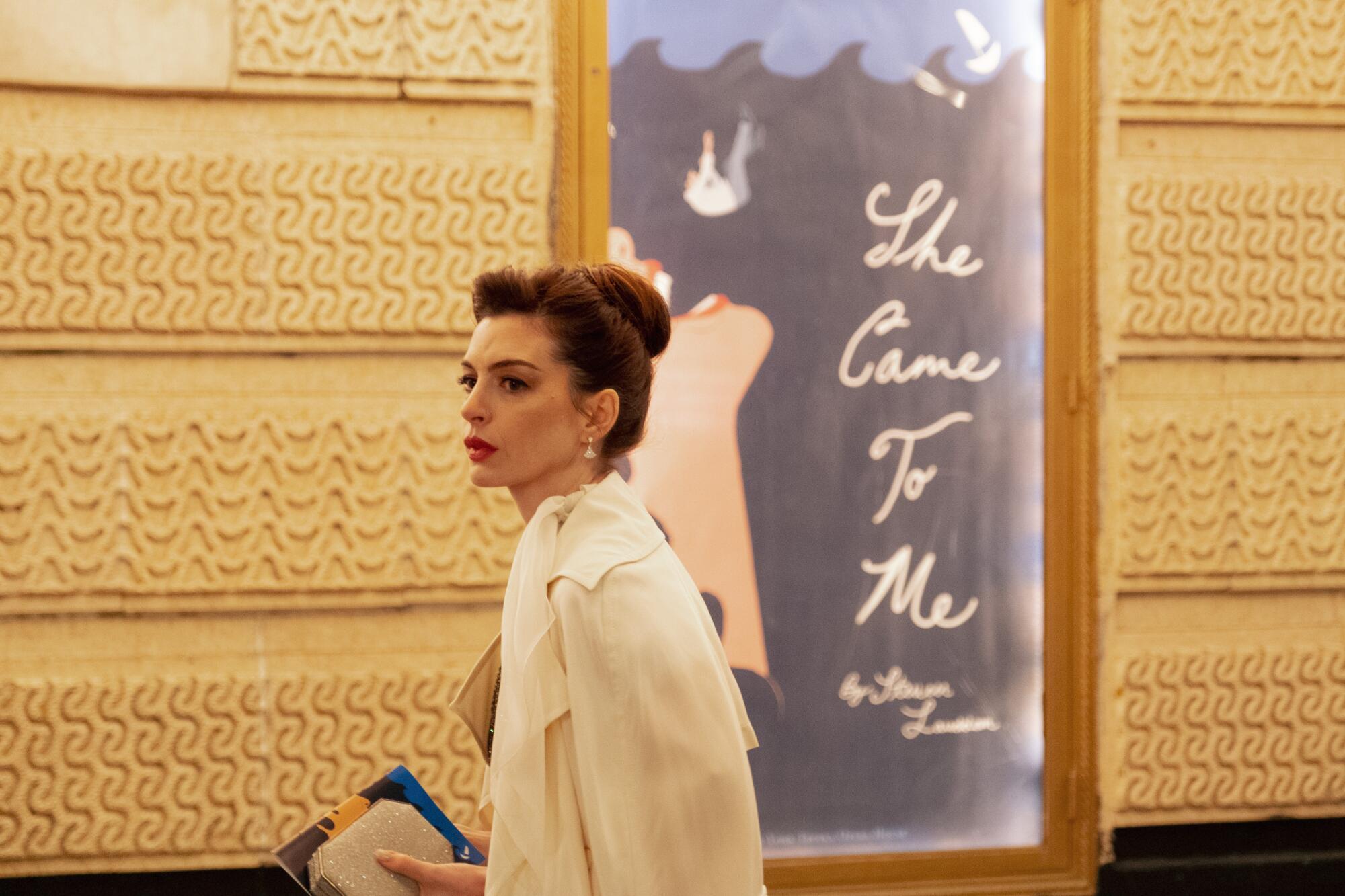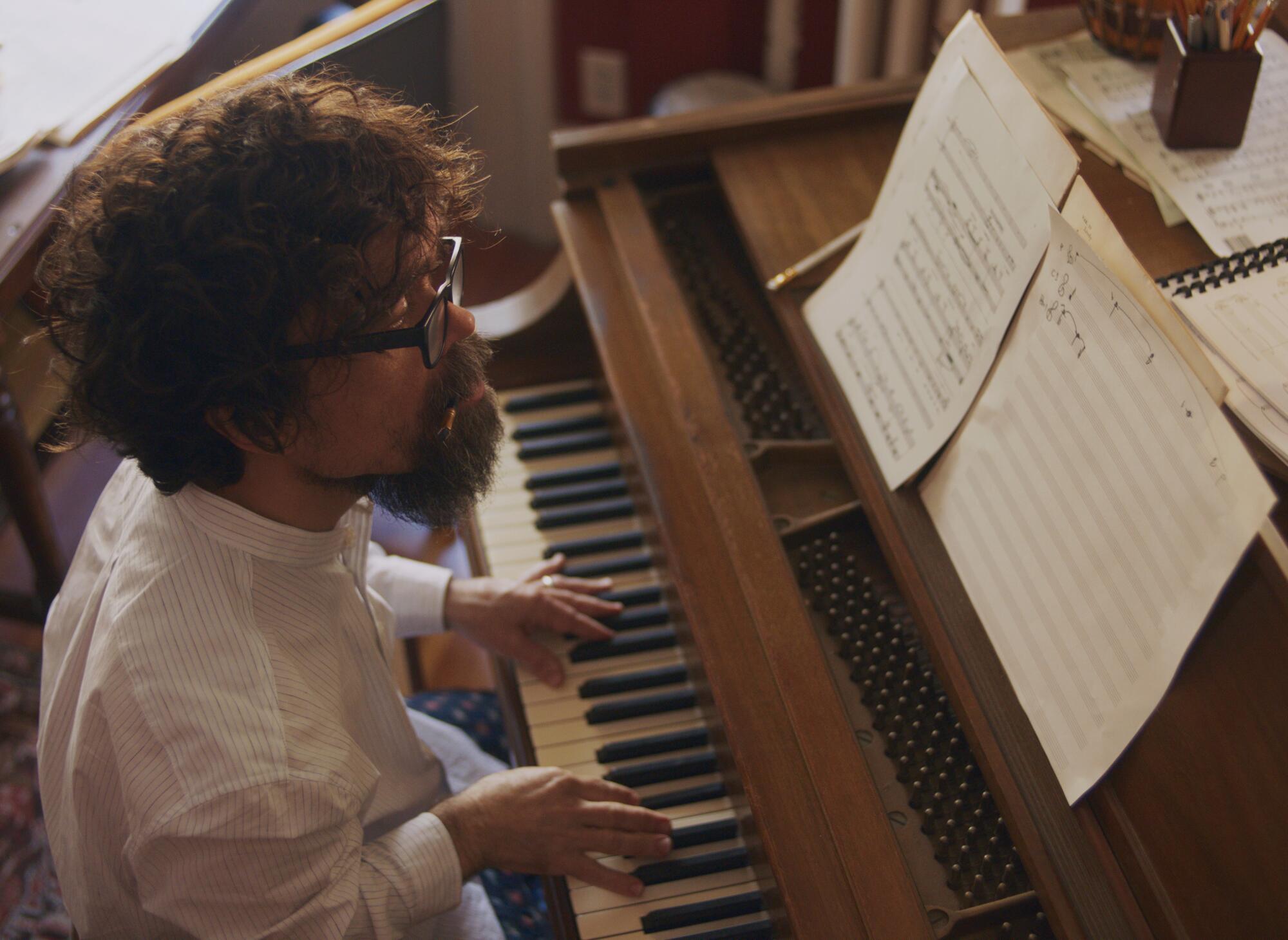
- Share via
It’s been six years since writer-director Rebecca Miller’s last feature, an HBO documentary about her famous father, the late playwright Arthur Miller. And another two years since her previous fiction film, 2015’s “Maggie’s Plan,” starring a pre-”Lady Bird” Greta Gerwig. So when Miller’s new movie, the wistful, delightfully unstable romantic comedy “She Came to Me” (opening Oct. 6), premiered at the Berlin Film Festival, some in the press described it as her comeback. But that’s not how she perceives things.
“I’m just plodding along,” Miller says over Zoom from her office in New York. “It takes quite a long time to get an independent film together, so I suppose it can feel like someone’s just been swallowed up by quicksand. But in reality, what they’re doing is creating a film and the producers are trying to find the money, and then we had the pandemic. And during that time, I was also working on a book of short stories. So, from my point of view, I’m just putting one foot in front of the other.”
Based on her own brief sketch about a novelist suffering writer’s block, “She Came to Me” expands Miller’s premise and changes the main character’s profession. Peter Dinklage plays Steven, a creatively stymied New York composer struggling to complete his latest opera. His cerebral psychiatrist wife, Patricia (Anne Hathaway), suggests he go for a walk to clear his head — an outing that will upend his life once he meets Katrina (Marisa Tomei), a blunt, horny tugboat captain.

“She Came to Me” boldly combines the screwball comedy and the existential drama, sharing with “Maggie’s Plan” a growing interest in using humor to tackle life’s great mysteries after focusing on more somber fare in 2002’s “Personal Velocity” and 2005’s “The Ballad of Jack and Rose” (the latter starring her husband, the actor Daniel Day-Lewis). Miller, who turns 61 in mid-September, finds it amusing that audiences might be thrown by her shift toward comedy.
“When I made ‘Maggie’s Plan,’ everyone was like, ‘But she’s not funny,’ ” she says, laughing. “I’m like, how do you know I’m not funny? I just haven’t been showing that part of myself as much. The older I get, the more I feel that looking at sad things through a lighter lens is hard. It’s very difficult to keep the bubbles of the soufflé up.”
Still, Miller owns up to a tide shift in her thinking. “It’s a forgiving way of looking at life,” she says of comedy, “which I find very attractive — especially right now. It’s not pretending that nothing terrible happens. It’s that you choose to look at the absurdity and the humor of life, and embrace it.”
Her characters may be more amusingly flawed than before, but they share with her earlier creations a soulful introspection and unbridled wanderlust: a desire to break free, and an uncertainty about whether true freedom is possible. Miller talked to The Times about her feelings about AI, her friendship with Gerwig and the long shadow of her dad’s legacy. This interview has been edited for length and clarity.
I love that your characters never behave like movie characters — they meander down their own paths, not worrying about conforming to a straightforward plot. That’s especially true with “She Came to Me.” All of them seem to be operating in their own universes.
Once a character has popped into my head and I’ve decided to write about them, I have an obligation — to honor them and to make them complete. I really do believe that if you put enough love and psychic energy into a character, they do start to generate their own destiny.
I remember showing my husband the first 20 pages of this. He was like, “Oh, my God, good luck.” [Laughs] There were so many balls in the air. He was like, “How are you going to land this?” But that’s part of the challenge.
Not the easiest thing to hear from Daniel Day-Lewis. Were you tired of working in a more serious vein?
I think that is part of it. But also, even in “The Ballad of Jack and Rose,” which is a very lyrical film and has a lot of wistfulness, there are funny sequences. I remember sitting in that screening of “Jack and Rose” and thinking, “Gosh, I love it when people laugh.” Even though it was a sad movie and everyone was sobbing, the parts where people laugh were so wonderful to be a part of. I thought, “What about changing the ratio?”

We’re in the middle of the WGA and SAG-AFTRA strikes. Are you concerned about AI’s encroaching influence on the creative process?
All the demands of the Writers Guild are very legitimate. I would be very surprised if AI could write “She Came to Me.” There would’ve had to be something terribly wrong with that computer. I believe that it’s all the more reason to write original work. Stay a step ahead of AI.
You write films, novels and short stories, but not plays. Is that because of your father?
Definitely. I would love to direct theater, produce theater. I think theater is a wonderful art and, in fact, very relevant for our future the more AI stands over us. Seeing a person actually sweat and cry right in front of you — actually feel things — is very powerful. I’ve always felt [writing plays] would just be too much. I’ve had enough to just make something of myself under that shadow that I wouldn’t invite more difficulty on myself.
In between these last two narrative features, you made a documentary about your dad, “Arthur Miller: Writer.” Sometimes, completing a project like that can make someone feel like they’re losing the person all over again. Was that true for you?
I actually felt very freed by the process. After we finished the film, I finally was able to sell the house that I had grown up in. It was not the right house for me, but I couldn’t bring myself to do it. But I felt that now the house had been kind of memorialized.
It was also about me understanding and coming to terms with him more as a man. I almost feel that everybody should make a documentary about their parents, no matter who they are — even if it’s 20 minutes long — because it makes you think about them in a way that isn’t just as their child. It doesn’t matter how old you are, you’re still your parents’ child.
Because your father was so famous, he sometimes pops up as a character in movies. Recently, Adrien Brody portrayed him in “Blonde.” How do you think he did?
Inevitably, anybody who plays anybody’s father, their child is going to see that that’s not fully the person. But I do think Adrien did a really good job. I personally feel that Marilyn has been dragged around enough, and making stuff up about her isn’t fair.

I feel like you’re not asked as often about your mother, Inge Morath, who was a photographer. What did she give you?
Her talking to me about the power of composition was huge. She would take me to museums. We would look at her own work and other people’s photography. She had enormous self-discipline, and I think that’s best transmitted by example. Also, she was a very non-narcissistic artist. She was a very generous mother and I think that was a great gift to me, and something that I hope I’ve continued with my own kids.
You were a mentor to Greta Gerwig in terms of encouraging her to pursue a directing career. Obviously, she’s having an amazing year.
She’s a dear friend of mine — I’m so happy for her and just so loving what she’s doing. She said when she made “Lady Bird” that watching me direct “Maggie’s Plan” inspired her to say, “OK, I’m going to direct my own film.” We have many things in common, me and Greta.
What do you have in common?
A humorous way of looking at the world. We each have two sons and also a stepson. There were little things: I remember once we were on the set of “Maggie’s Plan” and my bra strap was showing, and she said, “Oh, my God, I even have the same bra!” [Laughs].
I know you don’t perceive “She Came to Me” as a comeback, but I do think the film’s characters are, in a sense, trying to create new selves. Is that a theme that resonates with you?
I think that they’re all making a bid for freedom in completely different ways. Everybody creates an identity that we feel locked into. We judge ourselves and we decide: It’s over — I’m a baked cake, I can’t change anymore. But the truth is that people can radically change their lives, and I think that that’s a really important point. It doesn’t matter if you’re 40 or 50 years old, you can change your life, and in a way that maybe reflects who you are better.
How have you changed?
I was completely undomesticated — I mean, I lived with a bare bulb in the ceiling and a few chairs, and I only thought about making work, and that was it. I had relationships, but the idea that I would be taking care of other people was radically different from how I was. Then I chose a man to marry, had children and embraced another life.
Now my children are grown up, and I don’t really know. I stand at the precipice. I’m very happy to embrace adventures. I think it’s important to be awake and just to stay alive, because the temptation to die on the vine and still be alive, but secretly dead, is pretty intense.
More to Read
Only good movies
Get the Indie Focus newsletter, Mark Olsen's weekly guide to the world of cinema.
You may occasionally receive promotional content from the Los Angeles Times.











